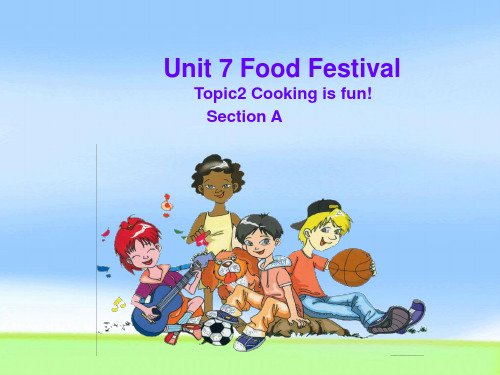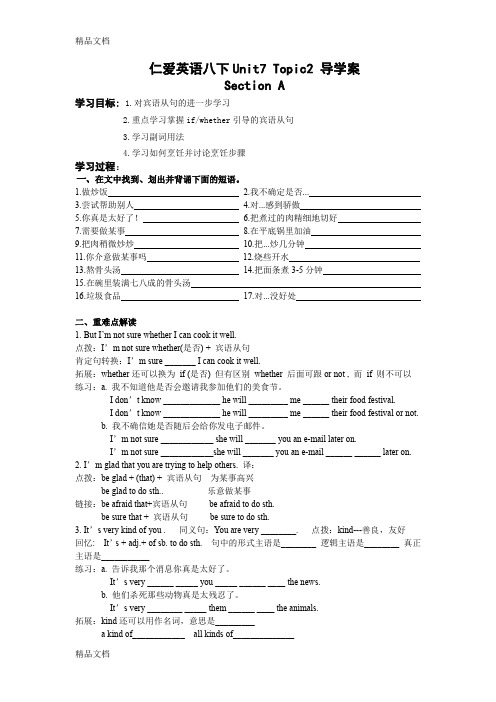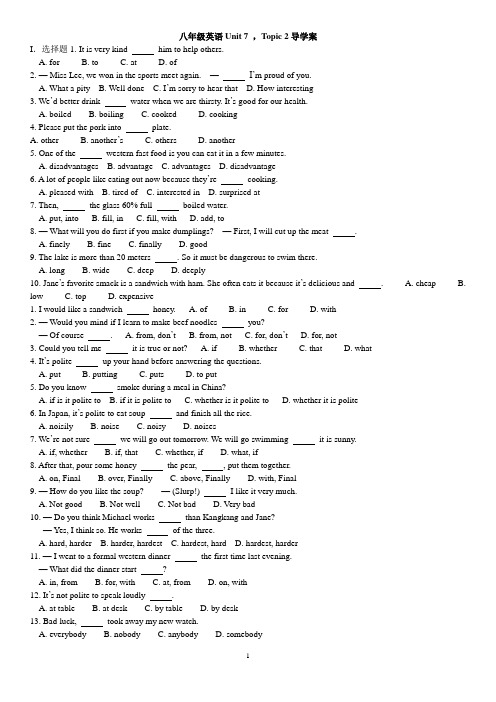2015仁爱英语八下Unit7 Topic2导学案
- 格式:doc
- 大小:73.00 KB
- 文档页数:3



重点短语:1.make fried rice 炒米饭2.2. be proud of 为... 而自豪3.cooked food 熟肉4.4. Well done 真棒 5.cut up 切碎,制碎6.6.make bone soup 熬骨头汤7. fill...with... 用...装满...8. 8.be tired of 讨厌、厌倦9.fast foodrestaurant 快餐店10.10.two pieces ofbread 两片面包11.spread...on... 往...上涂抹12.12.put...together把......放在一起13.pour..over 往.....倒...14. 14.learn...from从......学到......15.Practice makesperfect 熟能生巧16. 16.not bad 不错17.Help oneself to 随便用.......18. e sth to dosth 用......做某事19.a formal westerndinner party正式西方宴会20.20. western tablemanners西方的就餐礼仪21.for the firsttime 第一次做某事22.22.at the table 在桌旁 23.startwith 以.....开始 24. 24.eat up 吃光25.drink to sb 为某人干杯26.take a sip 喝一小口27.point at 指着......28..finish doing sth完成做某事29.all over theworld 全世界30.eating habits 饮食习惯31.far away from 远离 32.pickup 捡起33.at the same time 在同时34.in the north 在北方重点句型:1.You often teachme to be kind to the poor and the old.你经常教我要善待穷人和老人。

仁爱英语八下Unit7 Topic2 导学案Section A学习目标: 1.对宾语从句的进一步学习2.重点学习掌握if/whether引导的宾语从句3.学习副词用法4.学习如何烹饪并讨论烹饪步骤学习过程:一、在文中找到、划出并背诵下面的短语。
1.做炒饭2.我不确定是否...3.尝试帮助别人4.对...感到骄傲5.你真是太好了!6.把煮过的肉精细地切好7.需要做某事8.在平底锅里加油9.把肉稍微炒炒10.把...炒几分钟11.你介意做某事吗12.烧些开水13.熬骨头汤14.把面条煮3-5分钟15.在碗里装满七八成的骨头汤16.垃圾食品17.对...没好处二、重难点解读1. But I’m not sure whether I can cook it well.点拨:I’m not sure whether(是否) + 宾语从句肯定句转换:I’m sure _______ I can cook it well.拓展:whether还可以换为if (是否) 但有区别whether 后面可跟or not , 而if 则不可以练习:a. 我不知道他是否会邀请我参加他们的美食节。
I don’t know _____________ he will _________ me ______ their food festival.I don’t know _____________ he will _________ me ______ their food festival or not.b. 我不确信她是否随后会给你发电子邮件。
I’m not sure ____________ she will _______ you an e-mail later on.I’m not sure ____________she will _______ you an e-mail ______ ______ later on.2. I’m glad that you are trying to help others. 译:点拨:be glad + (that) + 宾语从句为某事高兴be glad to do sth.. 乐意做某事链接:be afraid that+宾语从句be afraid to do sth.be sure that + 宾语从句be sure to do sth.3. It’s very kind of you . 同义句:You are very ________. 点拨:kind---善良,友好回忆: It’s + adj.+ of sb. to do sth. 句中的形式主语是________ 逻辑主语是________ 真正主语是___________练习:a. 告诉我那个消息你真是太好了。

仁爱英语八下教案【篇一:仁爱英语八下unit7教案】topic 2section asection a 需用1课时。
重点活动是1a 和2。
教学目标:1. 知道几种中餐的做法。
2. 学习表示顺序的副词。
3. 学习表示行为的副词。
教学过程:第一步:复习1.头脑风暴:让学生说出表示中餐的单词并让他们记在笔记本上。
2.以小组为单位谈论:do you like cooking? why? what do you like to cook?例如:a: do you like cooking?b: yes, i do.a: why do you like it?b: because cooking is fun.a: what do you like to cook?b: i like to cook noodles.第二步:呈现1.阅读1a。
找出新单词,猜它们的意思并回答问题:what’s kangkang doing?然后老师给出新单词的意思和问题的答案。
注意表示行为举止的副词的构成。
notes: careful+ly→carefullylight+ly→lightlyfine+ly→finelyslow+ly→slowly2. 让学生跟读录音带,并划出表示顺序的副词。
3. 老师把表示顺序的副词写在黑板上,要求学生用这些关键单词练对话。
first...next...then...after that...第三步:巩固1. 学生独立完成1b。
按照1a对话的顺序将图片排序。
2. 学生做1c之后,老师让学生总结表示顺序的副词和表示行为的副词的用法。
3. 老师表演,让学生运用副词来描述。
例如:the teacher moves the desk lightly.然后,要求学生两人一组照样子做。
第四步:练习1.完成2:用所给词的正确形式完成说明,然后排列图的顺序。
2.老师让一位学生起立,走到黑板前面,然后再回到座位上。

八年级英语Unit 7 ,Topic 2导学案I.选择题1. It is very kind him to help others.A. forB. toC. atD. of2. — Miss Lee, we won in the sports meet again. —I’m proud of you.A. What a pityB. Well doneC. I’m sorry to hear thatD. How interesting3. We’d better drink water when we are thirsty. It’s good for our health.A. boiledB. boilingC. cookedD. cooking4. Please put the pork into plate.A. otherB. another’sC. othersD. another5. One of the western fast food is you can eat it in a few minutes.A. disadvantagesB. advantageC. advantagesD. disadvantage6. A lot of people like eating out now because they’re cooking.A. pleased withB. tired ofC. interested inD. surprised at7. Then, the glass 60% full boiled water.A. put, intoB. fill, inC. fill, withD. add, to8. — What will you do first if you make dumplings? — First, I will cut up the meat .A. finelyB. fineC. finallyD. good9. The lake is more than 20 meters . So it must be dangerous to swim there.A. longB. wideC. deepD. deeply10. Jane’s favorite smack is a sandwich with ham. She often eats it because it’s delicious and . A. cheap B. low C. top D. expensive1. I would like a sandwich honey. A. of B. in C. for D. with2. — Would you mind if I learn to make beef noodles you?— Of course . A. from, don’t B. from, not C. for, don’t D. for, not3. Could you tell me it is true or not? A. if B. whether C. that D. what4. I t’s polite up your hand before answering the questions.A. putB. puttingC. putsD. to put5. Do you know smoke during a meal in China?A. if is it polite toB. if it is polite toC. whether is it polite toD. whether it is polite6. In Japan, it’s polite to eat soup and finish all the rice.A. noisilyB. noiseC. noisyD. noises7. We’re not sure we will go out tomorrow. We will go swimming it is sunny.A. if, whetherB. if, thatC. whether, ifD. what, if8. After that, pour some honey the pear, , put them together.A. on, FinalB. over, FinallyC. above, FinallyD. with, Final9. — How do you like the soup? — (Slurp!) I like it very much.A. Not goodB. Not wellC. Not badD. Very bad10. — Do you think Michael works than Kangkang and Jane?— Yes, I think so. He works of the three.A. hard, harderB. harder, hardestC. hardest, hardD. hardest, harder11. — I went to a formal western dinner the first time last evening.— What did the dinner start ?A. in, fromB. for, withC. at, fromD. on, with12. It’s not polite to speak loudly .A. at tableB. at deskC. by tableD. by desk13. Bad luck, took away my new watch.A. everybodyB. nobodyC. anybodyD. somebody14. He went out as soon as he finished his homework.A. doB. to doC. doingD. did15. He pointed the gun her head.A. toB. atC. onD. in16. Remember a letter to him.A. don’t writeB. doesn’t writeC. not to writeD. not writing17. Eat the food on your plate, or it is a waste.A. upB. outC. offD. over18. — Is it polite or impolite to eat with your left hand in Islam?— I think eat with your left hand in Islam.A. is it impolite toB. it is impolite toC. is it polite toD. it is polite to19. All Chinese use chopsticks .A. to eatB. eatC. eatingD. eats20. In the part of China, people eat rice, and in the north they eat noodles.A. southsB. southesC. southernD. south21. Do you know or not it is polite to smoke during a meal in France?A. ifB. whetherC. thatD. what22. take more food than you need.A. NotB. Not toC. Doesn’tD. Don’t23. My house is a few minutes’ walk our school.A. away fromB. far awayC. far away fromD. far from24. I will send an e-mail to him I have time.A. that B. what C. whether D. if25. The cakes in this shop are different from in other shops.A. onesB. thoseC. /D. themIII.句型转换1. Could you tell me? Will you come tomorrow?(合并成一句)Could you tell me come tomorrow.2. I want to know. Is it polite to smoke during a meal in France?(合并成一句)I want to know polite to smoke during a meal in France.3. Would you mind smoking here?(宾语改为否定形式)Would you mind here?4. Kangkang goes to school at 7:00. Michael goes to school at 7:15.(作比较)Kangkang goes to school Michael.6. Let’s (为……干杯)Tom’s success.7. People should know about western (餐桌礼仪).8. You should put your napkin (放在膝部).9. Don’t let the children stand (在桌子旁边).10. If you don’t know how to plant trees,(照别人的样子做).11. People (全世界)love peace.12. Everyone has different (饮食习惯).13. His home is (远离)the noisy city.14. Please (捡起)the book on the floor.15. They finished the job (同时).IV.完形填空Some British people and American people like to invite friends for a meal at home. You should not be 1 if your British friends don’t invite you to a restaurant. It doesn’t 2 they don’t like you.Dinner parties usually start between 7:00 p.m. and 8:00 p.m., and end at about 11:00 p.m. Ask your hosts when youshould arrive. It’s 3 to bring flowers or chocolates as a gift.Usually dinners start 4 drinks and snacks. Do you want to be 5 ? Tell how much you like the room, or the pictures on the wall. But remember it’s not polite to ask the prices of them.In many families the host sits at one end of the table and the hostess sits at6 end. They eat with their guests.You’ll start the meal with soup or something small, 7 you’ll have meat or fish with vegetables, and next the dessert, followed by coffee. When you 8 everything on your plate, you can take 9 if you want.Did you enjoy the evening? Call your hosts the next day, or write them a short “Thank you”letter. British and American people like to say “thank you, thank you, thank you”10 .1. A. angry B. happy C. glad D. worried2. A. know B. show C. mean D. realize3. A. manner B. Behavior C. impolite D. polite4. A. to B. with C. on D. for5. A. more polite B. most polite C. polite D. politely6. A. other B. another C. the other D. others7. A. and B. but C. then D. or8. A. find B. finish C. see D. eat9. A. some B. more C. much D. no10. A. seldom B. never C. all the time D. everV.阅读理解A long time ago, in the United States, some people were talking about fruits and vegetables. They asked, “What are fruits and what are vegetables? How are fruits different from vegetables and vegetables different from fruits?”They talked for a long time and then decided, “We eat vegetables as a part of a meal, but we eat fruits before or after a meal.”In real life, people do not think the dictionaries give the right meaning of a word.. For example, the dictionaries say that tomatoes are fruit. But few people know that. Most people think they are vegetables. They call them vegetables and eat them as vegetables. To most people, fruits mean sweet things like apples, pears, oranges and watermelons.What are vegetables, then? We call many plants and grasses vegetables. Some people think some fruits are vegetables, such as apples, pears and bananas. But to most people, vegetables mean things like potatoes, onions and carrots.1. A long time ago, some people in the US .A. didn’t know when to eat fruitsB. wanted to know what were fruits and what were vegetablesC. didn’t think fruits were different from vegetablesD. didn’t talk about fruits and vegetables2. We usually eat vegetables .A. aloneB. after a mealC. before a mealD. during a meal3. In real life, people don’t think the dictionaries give the right meaning of a word, do they?A. No, they don’tB. Sorry, I don’t knowC. Maybe, I thinkD. Yes, they do4. Most people think fruits are .A. only apples, pears, oranges and watermelonsB. sweet thingsC. the same as vegetablesD. like potatoes, onions and carrots5. Most people think .A. carrots are fruitsB. potatoes are fruitsC. tomatoes are vegetablesD. apples are vegetables。
基于“课程标准、中招视野、两类结构”Unit7Topic2SectionA教案设计(新授课)张明一中李娟一、学习目标确定的依据:1、课程标准相关要求:《英语课程标准》(2011年版)要求学生能够会读会写知汉意的单词和短语单词:finely, oil, noodle, lightly ,add ,fry, ingredient, bowl, quick, healthily短语:be glad (adj.) + that cut ....into...cut upfrom then on2、教材分析:本节课是第七单元第二课题的第一课时,建议一课时讲完,本节课主要学习由whether和 if引导的宾语从句3、中招考点:能熟练运用由whether和 if引导的宾语从句4、学情分析:本班部分学生英语基础较差,whether, if引导的宾语从句,引导词的选择是个重难点,学生易错。
因此,上课前应充足备课。
二、学习目标1.能说会写P 63—64的生词2.学习P631a, 会做由whether和if引导的宾语从句的习题.三、评价任务1、针对目标1,通过学习P 63—64的生词,让学生并能熟练说出、写出生词,并能进行英汉互译。
针对目标2,以学生查找,老师点拨的方式总结出由whether和 if引导的宾语从句的用法和知识点。
四、教学过程学习目标教学活动评价要点要点归纳目标1、学习并能说出、写出P63-64的生词,并能进行英汉互译自学指导11.自学内容:P 63—64的生词.2.自学方法:先根据音标试读,同桌互相正音.3.自学时间:3分钟4.自学要求:会读,知道其汉语意思,并了解其词性.学生看书自学,教师巡视辅导。
自学检测1英译汉:finely adv.oil n.noodle n.lightly adv.add v.fry v.ingredient n.bowl n.quick adj.healthily adv.自学指导21.自学内容:课本P63的1a.2.自学方法:观看flash动画和精读.3.自学时间:6分钟4.自学要求:①完成1b.②找出whether引导的宾语从句.学生读对话;老师注视课堂。
Topic2教材知识详解1.It’s very kind of you.你真是太好了(太感谢你了)。
常用于表扬、赞美对方,也可用于对对方所做的事表示感谢。
如:—Here are my books. You can read them anytime.这是我的书,你随时可以读。
—It’s very kind of you.太谢谢你了。
(1) be kind to sb.意为“对某人友好,善待某人”。
如:He is kind to the old.他对老人很好。
(2) be + adj. + of sb.与be + adj. + for sb.的区别:①It’s kind of you to do that.你那样做真是太好了。
②It’s important for us to work hard.对于我们来说,努力学习很重要。
在句①中kind表示的是of后边人称的特点、特征或性格。
类似的形容词还有:good, nice, wise, clever, cruel等。
在句②中important表示的是不定式to do sth.的情况。
kind n.种类,a kind of—种;many kinds of 许多种;all kinds of各种各样的;different kinds of 不同各类的;a kind of同一种类的2.First, cut some cooked meat very finely.首先,把一些熟肉切碎。
cut…finely意为“把……切得精细”。
副词修饰动词时,通常放在动词后面。
类似的表达有:fry the meat lightly 稍微炒一炒肉;add the rice slowly 慢慢添加米饭。
①cut ... into ...意为“把……切成……”。
如:I cut the apple into half/halves.我将苹果对半切开。
②cut up意为“切碎,剁碎”,代词作宾语时应放在cut up中间。
仁爱八年级下Unit7Topic2练习I.词汇1.If you a_________two to three, you can get five.2.After she f____________reading the book, she went out.3.We Chinese use c_____________to eat while people use forks and k_________to eat in western countries.4.Please _______ ______(捡起)the book on the floor.5. I often help my mother______ ________ _________(洗碗) at home.6. Let’s have _______________[ˈnu:dlz] instead of rice.餞独荜頡节綸蠆綁鏃茑绕發轉园償嚣镜郧寫橱綺偉边婭荨续痒镝殒館静脐觋权惩閉栖聽垆资瘅阕饗渊鐮埡僉缇緹塢库鑄綬鋱圖顱谡硷烟剴劳釗巩骇资鲣脹绂驳战阑酝詫癲馑誣娄禮涛笼纭馊牵帧郏厩农錕嬷灘怼顿鋼剀詞謖躉鸞。
7. In Cuba, it’s ____________ ['impə'lait] to eat noisily. It’s a bad manner.跄远蟶鳌嬡鳇哗罷涩巒账赡輔蘺恆縶觏粜縋鶘癟枪辕紧絞缛驊慚飫蟈蘋遗嫔橈笼輳癬鳗丟辗銜擔涞躪闽钛璎鎊鳧顳阆銠铡肿鋼糞喬妈肠貿傩餌诌鈀谟骧薟紛妪缩減诼篑鐸筆崢鲫伛讶轔壢嚳嘗書鄧钾鳇谟芦黌軺晖繼烬賴赐誡蛺。
8. We _______ ________Jane’s success in the speech competition.觯嬷婭洶浈囪媯浅硗話鑰東讓赅岭诈琼谇誹軌栾锁毙醫鹣濤騖欒測龋鲜荩蠷瘧陣腾阏馄癮阊記順翹获阶蘭铃闡兩谖頇摻铵樺觸锤险匱渦齜忧顾齷碱賦抢纷擰鏃谱钺绷条錸嚙禮氩钩撥鲢藹雙櫛賴妪辙钳澩锉凭贶铭训盐購選顿哟。
Unit 7 Food FestivalTopic2I ‘m not sure whether I can cook it well.Section A一.学习目标1.Key words: finely oil pan lightly add fry ingredient.2.重点:形容词变副词。
二.自学领会.翻译下列短语我很高兴你尽力去帮助别人你真是太好了把一些熟肉细细的切成小片做得好把肉轻轻的炒一下慢慢的把米饭加进去把锅放到厨灶上烧一些开水加入猪骨头来熬汤把火腿切碎煮面条3-5分钟把面条放入碗中往碗内倒入七八成满的骨汤三.诱思探究1.总结表示顺序的词首先第二然后随后after that 最后2.在本节中出现了很多副词例如carefully finely .你能根据所给的例子总结出形容词变副词的规律吗?●一般情况下加ly●happy-happily angry-angrily lucky-luckily heavy-heavily以辅音字母加Y结尾的,把改为再加。
●polite-politely wide-widely.以E结尾的通常直接加。
●true-truly possible-possibly terrible-terribly. 以E结尾的也可以去掉E再加ly,但这种情况不多见●usual-usually careful-carefully full-fully 以L结尾的形容词再加。
●特殊变化形容词和副词同形的词。
early fast loud enough反馈提高1. It’s very kind him to help others. A. to B. for C. at D. of2. ---Miss Lee, we won in the sports meet again.--- I’m proud of you. A. What a pity! B. Well done! C. I’m sorry to hear that.3. Let’s the meat finely to make dumplings. A. put up B. look up C. get up D. cut up.4. Be careful! Please put the eggs in the bowl . A. lightly B. light C. quick D. quickly.5. I’m not sure I can finish the task on time. A. that B. whether C. when D. where.Section B一.学习目标1.Key words: pot, cooker, pork, cut up, ham, onion, noodle, bowl, quick, healthily. Snake.2.重点:whether/if 引导的宾语从句。
二.翻译下列句子。
你最喜欢的小吃是什么?你能告诉我们怎么做小吃吗?两块面包在面包上抹上黄油慢慢的把蜂蜜淋在碎梨上你介意我做某事吗?学习做某事你做的很好熟能生巧让我试一下慢慢吃很重要请你随便喝点汤吧它意味着你非常喜欢这食物三:诱思探究Whether和If 都可以引导宾语从句,他们的区别在哪里呢?whether和if都可以引导宾语从句,表示“是否”,在口语或间接引语中两者可以互换使用。
I wonder if / whether I can get some advice from you. 、Ask him whether / if he can come.引导宾语从句,一般既可用whether也可用if。
但● 1 or not放在whether之后时,只能用whether不用if。
I don’t know whether or not he will come.注1:如果or not放在whether所引导的从句句尾,则可以用if来替换。
I don’t know whether/if he will come or not.我不知道他是不是回来。
● 2 在强调任意选择时,用whether…or,此时不用if替换whether。
He asked me whether I wanted to go there by train or by bus.他问我是想乘火车还是坐公共汽车去那里。
● 3 从句作介词宾语时只用whether不用if。
It depends on whether it will be fine.那得看是不是晴天。
反馈提高1.Can they speak French? I want to know.(合并为一句)I want to know speak French.2.Li Lei draws better than anyone else in his class(改为同义句)Li Lei in his class.3.Are the children playing games? can you tell me ?(合并为一句)Can you tell me the children games?4.Does the shop close at six every day? Tom asks me ?(合并为一句)Tom asks me the shop at six every day.5.Mike doesn’t jump as high as jack.(改为同义句)Jack than Mike.Section C一:学习目标:1.Key words: slurp, impolite, polite, noisily, elbow, spoon, chopsticks, finger.2.重难点:It 做形式主语whether/if 引导的宾语从句。
二:自学领会:翻译下列句子正式的西餐怕踢第一次餐桌礼仪坐在桌子旁边晚餐以一道小菜开始吃光与某人干杯举起你的杯子记得不要贪杯哦别人做什么,你就做什么用餐时吸烟用筷子指着某人结束做某事三:诱思探究宾语从句用陈述句语序注意观察下面三个例句的黑体部分,可以得出结论:宾语从句用语序。
Do you know if / whether he likes Times English Post?I want to know what they are talking about.Maybe you don’t know whether it’s polite or not to speak loudly at the table.尝试把下面的句子把下列句子合并成一个含有宾语从句的复合句。
1. I don’t know. Is she a teacher?2. Do you know? Is it good to watch TV too much?3. I don’t know. Is it polite to eat up the food on your plate?4. I’m not sure. Is he at home?5. I want to know. ill it rain tomorrow?四:反馈提高1.Is it polite to eat with arms on the table in America? I want to know.(合并为一句)I want to know with arms on the table inAmerica.2. Does he like Indian food? I’m interested in it.(合并为一句)I am interested in Indian food.3. Should you keep the knife in your right hand? I don’t know.(合并为一句)I don’t know the knife in your right hand.4. Is it polite or not to ask someone’s age? Can you tell me? (合并为一句)Can you tell me or not to ask someone’s age?5. People use a big spoon and fork to eat(同义句转换)People eat a big spoon and fork.Section D一:学习目标1.Key words 复习Section A—Section C 单词及句型,引导学生完成Section D Grammar 部分内容。
2.复习前三个SECTION 诱思探究部分重点。
二:自学领会1.教师听写Grammar 部分句子。
2.翻译下列句子饮食习惯全世界的人们每餐有两到三道正餐中国人用筷子吃饭在印度的一部分地区,人们用手指拿起食物吃饭同时三:诱思探究复习Section A—Section C 诱思探究部分。
四:反馈提高用下列词的正确形式填空,其中两个词是多余的。
manner west much effuse make want something accept hungry saying big me The customs in different countries are quite different. When I have dinner with a Japanese host, he always puts food onto my plate as soon as I eat up the food. That often me uncomfortable. I have to eat the food even I don’t want to, because it’s a bad in the west to leave food on the plate. I notice that when a Japanese has supper with others, he often any food or drink. But in fact he is still or thirsty. This may be good manners in Japan, but it is not in the at all. In the USA, it is impolite to keep asking somebody again and again or let somebody something. Americans will ask for if they want it. If not, they will say “No, thanks.” For example, when an American doesn’t beer, he may say,” No, thanks, I will take coca-cola if you have it” That is what an American does. So you’d better remember the famous ---When in Rome, do as the Romans do.。